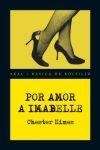Por amor a Imabelle

Editorial Akal
Colección Básica de bolsillo Akal, Número 0
Fecha de edición enero 2010 · Edición nº 1
Idioma español
EAN 9788446028475
240 páginas
Libro
encuadernado en tapa blanda
Dimensiones 18 mm x 12 mm
Resumen del libro
Por el amor de la sensual y pícara Imabelle, Jackson pierde los ahorros de toda su vida al dárselos a un confidente de la Policía que sabe convertir billetes de diez dólares en billetes de cien; luego robará a su jefe para perder posteriormente el dinero en una sala de juego. Por fortuna para él, Jackson tiene un hermano gemelo bastante avispado, Goldy, quien, disfrazado de hermanita de la caridad, se gana la vida en Harlem vendiendo entradas para el Cielo. Ahora toca zanjar las deudas
Biografía del autor
Chester Himes, in full Chester Bomar Himes, (born July 29, 1909, Jefferson City, Mo., U.S. died Nov. 12, 1984, Moraira, Spain), African-American writer whose novels reflect his encounters with racism. As an expatriate in Paris, he published a series of black detective novels.<br><br>The domination of his dark-skinned father by his light-skinned mother was a source of deep resentment that shaped Himes's racial outlook. The family's frequent relocations, as well as the accidental blinding of his brother, further disrupted his childhood. Himes attended Ohio State University. From 1929 to 1936 he was jailed at the Ohio State Penitentiary for armed robbery, and while there he began to write fiction. A number of his stories appeared in Esquire and other American magazines. After his release from prison, he worked at numerous odd jobs and joined the Works Progress Administration, eventually serving as a writer with the Ohio Writers' Project.<br><br>His first novel, If He Hollers Let Him Go (1945), details the fear, anger, and humiliation of a black employee of a racist defense plant during World War II. Lonely Crusade (1947) concerns racism in the labour movement. Cast the First Stone (1952) portrays prison life, and The Third Generation (1954) examines family life.








